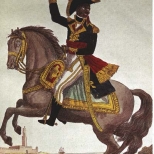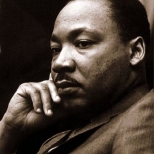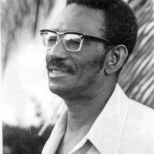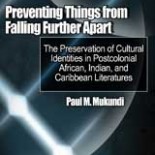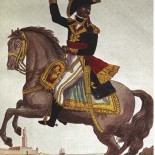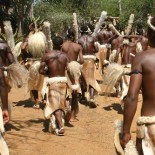Awards and Recognitions
Beginning Fall 2009, SORAC will seek to implement an Awards & Recognitions program that will recognize the Africa-related contributions of those special guests who are invited to give keynote speeches at our conferences and panels.
Two types of special awards will be implemented:
- The Toussaint Louverture/Martin Luther King, Jr. Award
(See also: Why Toussant Louverture and Martin Luther King, Jr.?) - The Cheikh Anta Diop Award
(See also: Why Cheikh Anta Diop?)
To view our list of award recipients, click here.
A. The Toussaint Louverture/Martin Luther King, Jr. Award
The Toussaint Louverture/Martin Luther King, Jr. Award will be bestowed upon all those who, nationally and/or internationally, have played an important role in the political, social and/or economic emancipation of Africans and people of African descent around the world. This award will mostly target political activists and personalities whose role in the area of cilvil, economic and political rights is recognized as having contributed to such an emancipation.
Why Toussaint Louverture? François-Dominique Toussaint Louverture, also Toussaint Bréda, Toussaint-Louverture (1743 – April 7, 1803) was an important leader of the Haïtian Revolution and the first leader of a free Haiti. By establishing dominance over the majority of blacks, he led them to victory over the whites and free coloreds and established his control over the colony in 1797, calling himself a dictator. He expelled the French commissioner, Léger-Félicité Sonthonax, as well as the British armies, invaded Santo Domingo to free the slaves there, and wrote a constitution naming himself governor for life that established a new polity for the colony. Between the years 1800 and 1802 he tried to rebuild the collapsed economy of Haiti and reestablish commercial contacts with the United States and Great Britain. Although he was deceived by Napoleon and exiled to France and an early death, he had given the colony a taste of freedom that could not be retracted. He had destroyed the colony as it had been.[
Toussaint Louverture was a slave from Plaine du Nord who reportedly was a fervent Catholic.[2][3] He joined the Spanish army where he was able to organize 4,000 blacks into a band of loyal guerrilla troops, as he was was a naturally brilliant, although untrained, general. When the French Legislative Assembly decreed full equality to all Haitians on April 4, 1792, he switched his loyalty to the French, and fought the Spanish. He was also effective against the British and by 1795, he was in control of most of two provinces. Two of his lieutenants, Jean-Jacques Dessalines and Henry Christophe were extremely effective. However, André Rigaud, who controlled a force of black troops in the South, was driven to renew his attacks by Toussaint’s success and continued to control the South.[4]
By June of 1795, the English had been driven back to the coast and in July the Spanish officially withdrew and ceded the island of Santo Domingo to the French. Although the English continued to fight, Toussaint maintained his control over the North and West. In 1798, the British made a last ditch attempt to oust Toussant from the South, sending General Thomas Maitland. Maitland failed in this attempt and signed a secret treaty making Toussaint an indepedndent ruler. The British left Sanit-Domingue completely in October of 1798, leaving Rigaud and Alexander Petion in the south and Toussaint to fight against each other for control.[4] Tousaint appointed Jean-Jacques Dessalines to govern the South Province to dismantle the remaining colored forces. Dessalines killed thousands and crushed the the resistance. His brutality left bitterness among people of color.[4] By 1799, Toussaint had subordinated all remaining colored forces.[1]
In command of the entire island, Toussaint dictated a constitution that made him governor general for life with near absolute powers. Catholicism was the state religion, and many revolutionary principles received ostensible sanction. There was no provision for a French official, however, because Toussaint professed himself a Frenchman and strove to convince Bonaparte of his loyalty. Bonaparte confirmed Toussaint’s position but saw him as an obstacle to the restoration of Saint-Domingue as a profitable colony. Denying that he was trying to reinstate slavery, Napoleon’s brother-in-law Charles Leclerc attempted to regain French control of the island in 1802. He landed on the island on January 20 and moved against Toussaint. Over the following months, Toussaint’s troops fought against the French but some of his officers defected to join Leclerc, as well as chief black leaders like Dessalines and Christophe. On May 7, 1802, Toussaint signed a treaty with the French in Cap-Haïtien, with the condition that there would be no return to slavery, and retired to his farm in Ennery. However, after three weeks, Leclerc sent troops to seize Toussaint and his family, shipping them to France on board a warship, since he was suspected of plotting an uprising. They reached France on July 2. On August 25, 1802, Toussaint was sent to the castle Fort-de-Joux in Doubs, where he was confined and interrogated repeatedly, and where he died of pneumonia in April 1803.
(Source: Wikipedia, Sept. 03, 2007)
Why Matrin Luther King, Jr.? Martin Luther King, Jr. (January 15, 1929 – April 4, 1968) was one of the main leaders of the American civil rights movement. He was a political activist and Baptist minister and is regarded as one of America’s greatest orators. King’s most influential and well-known public address is the “I Have A Dream” speech, delivered on the steps of the Lincoln Memorial in Washington, D.C. in 1963. In 1964, King became the youngest man to be awarded the Nobel Peace Prize (for his work as a peacemaker, promoting nonviolence and equal treatment for different races).
In 1977, he was posthumously awarded the Presidential Medal of Freedom by Jimmy Carter. In 1986, Martin Luther King Day was established as a United States holiday. In 2004, King was awarded a Congressional Gold Medal.
Martin Luther King, Jr., was born on January 15, 1929, in Atlanta, Georgia. He was the son of Reverend Martin Luther King, Sr. and Alberta Williams King. He had an older sister, Willie Christine (September 11, 1927) and a younger brother, Albert Daniel (nicknamed ‘A.D.’; July 30, 1930 – July 21, 1969). King sang with his church choir at the 1939 Atlanta premiere of the movie Gone with the Wind. He entered Morehouse College at age fifteen, skipping his ninth and twelfth high school grades without formally graduating. In 1948, he graduated from Morehouse with a Bachelor of Arts (B.A.) degree in sociology, and enrolled in Crozer Theological Seminary in Chester, Pennsylvania, and graduated with a Bachelor of Divinity (B.D.) degree in 1951. In September 1951, King began doctoral studies in Systematic Theology at Boston University and received his Doctor of Philosophy (Ph.D.) on June 5, 1955.
King is one of the most widely revered figures in American history. Even posthumous accusations of marital infidelity and academic plagiarism have not seriously damaged his public reputation but merely reinforced the image of a very human hero and leader. It is true that King’s movement faltered in the latter stages, after the great legislative victories were won by 1965 (The Voting Rights Act, and the Civil Rights Act). But even the sharp attacks by more militant blacks, and even such prominent critics as Muslim leader Malcolm X, have not diminished his stature. However, criticism did not consist of mere blind attacks. Stokely Carmichael was a separatist and disagreed with King’s plea for integration because he considered it an insult to a uniquely African American culture and Omali Yeshitela urged Africans to remember the history of violent European colonization and how power was not secured by Europeans through integration, but by violence and force. To then attempt to integrate with the colonizers’ culture further insulted the original African cultures. Even the notion of decolonization was problematic for Frantz Fanon, an influential figure for black liberation movements. In Decolonizing, National Culture, and the Negro Intellectual (1961) he had this to say about the violent foundation on which colonizers claimed their names against the exploited and obstacles in making peace under such circumstances:
Decolonization is the meeting of two forces, opposed to each other by their very nature, which in fact owe their originality to the sort of substantification which results from and is nourished by the situation in the colonies. Their first encounter was marked by violence and their existence together—that is to say the exploitation of the native by the settler—was carried on by dint of a great array of bayonets and cannons… The naked truth of decolonization evokes for us the searing bullets and blood-stained knives which emanate from it. For if the last shall be first, this will only come to pass after a murderous and decisive struggle between the two protagonists. That affirmed intention to place the last at the head of things, and to make them climb at a pace (too quickly, some say) the well-known steps which characterize an organized society, can only triumph if we use all means to turn the scale, including, of course, that of violence.
On the international scene, King’s legacy included influences on the Black Consciousness Movement and Civil Rights Movements in South Africa. King’s work was cited by and served as an inspiration for another black Nobel Peace prize winner who fought for racial justice in that country, Albert Lutuli.
A statue of King located within Ingram Park, Birmingham, AlabamaKing’s name and legacy have often been invoked since his death as people have begun to debate where he would have stood on various modern political issues were he alive today. For example, there is some debate even within the King family as to where he would have stood on gay rights issues. King’s widow Coretta has said publicly that she believes her husband would have supported gay rights, his daughter Bernice believes he would have been opposed to them.[53] The King Center lists homophobia as an evil that must be opposed.[54]
In 1980, King’s boyhood home in Atlanta and several other nearby buildings were declared as the Martin Luther King, Jr. National Historic Site. At the White House Rose Garden on November 2, 1983, U.S. President Ronald Reagan signed a bill creating a federal holiday to honor King. It was observed for the first time on January 20, 1986, and is called Martin Luther King Day. It is observed on the third Monday of January each year, around the time of King’s birthday. In January 17, 2000, for the first time, Martin Luther King Day was officially observed in all 50 U.S. states.[55]
In 1998, Alpha Phi Alpha Fraternity was authorized by the United States Congress to establish a foundation to manage fund raising and design of a Martin Luther King, Jr. National Memorial.[56] King was a prominent member of Alpha Phi Alpha, the first intercollegiate Greek-letter fraternity established for African Americans. King will be the first African American honored with his own memorial in the National Mall area and the second non-President to be commemorated in such a way. The sculptor chosen was Lei Yixin. [57] The King Memorial will be administered by the National Park Service.
King is one of the ten 20th century martyrs from across the world who are depicted in statues above the Great West Door of Westminster Abbey, London. He is also commemorated in the Calendar of Saints of the Evangelical Lutheran Church in America as a renewer of society and martyr on January 15.
On April 4, 1968, King was assassinated in Memphis, Tennessee.
(Source: Wikipedia, Sept. 03, 2007)
The Cheikh Anta Diop Award be bestowed upon all those who, nationally and/or internationally, have played an important role in the intellectual and cultural emancipation of Africans and people of African descent around the world. This award will mostly target scholars and intellectuals whose role in the diffusion and promotion of groundbreaking knowledge on Africa is recognized as having contributed to such an emancipation.
Why Cheikh Anta Diop? Cheikh Anta Diop (29 December 1923–7 February 1986) is a Senegalese historian and anthropologist whose studies have placed emphasis on the human race’s origins and on the study of pre-colonial African culture and its connectedness to the rest of the peoples of the world. He has been considered one of the greatest African historians of the 20th century by some, and a racialist scientist by others.
Cheikh Anta Diop was born in Diourbel, Senegal. His early education was in a traditional Islamic School. At the age of 23, he went to Paris in 1946 to become a physicist. He remained there for 15 years, studying physics under Frédéric Joliot-Curie, Marie Curie’s son-in-law, and ultimately translating parts of Einstein’s Theory of Relativity into his native Wolof. In the 1940s, the study of African history was dominated by Europeans who considered Africans people without a past. Diop also mastered studies of African history, Egyptology, linguistics, anthropology, economics, and sociology as he armed himself for the task of setting the historical record straight.
In 1951, Diop submitted a Ph.D. thesis at the University of Paris where he argued that ancient Egypt had in fact been a Black African culture. The thesis was rejected, but over the next nine years, Diop reworked the thesis, adding stronger evidentiary support, and in 1960, he succeeded in the defense of his thesis and was awarded the Ph.D. degree. Five years earlier, the thesis had been published in the popular press as a book titled Nations nègres et culture (Negro Nations and Culture), proving very successful and making him one of the most controversial historians of his time. He eventually earned 5 PhDs.
After 1960, Diop went back to Senegal and continued writing. A radiocarbon laboratory was established with the University of Dakar (which was later named Cheikh Anta Diop University of Dakar after his death), and Diop was made its head. He had said, “In practice it is possible to determine directly the skin color and, hence, the ethnic affiliations of the ancient Egyptians by microscopic analysis in the laboratory; I doubt if the sagacity of the researchers who have studied the question has overlooked the possibility.” One of his important works published in journals is the dosage test—a technique developed by Diop to determine the melanin content of the Egyptian mummies. This technique was later adopted by forensic investigators to determine the “racial identity” of badly burnt accident victims.
In 1974, Cheikh Anta Diop participated in a UNESCO symposium in Cairo, where he presented his theories to other specialists in Egyptology. He also wrote the chapter about the origins of the Egyptians in the UNESCO General History of Africa.
Diop’s first work translated into English, The African Origin of Civilization: Myth or Reality, was published in 1974, revealing his views to a much greater audience. In this work, he claimed that archaeological and anthropological evidence supports his Afrocentric view of the Pharaohs being of Negroid origin. While many scholars draw heavily from his groundbreaking work, the Western academic world as a whole does not accept Diop’s theories. However, they continue to raise important questions about the cultural bias inherent in scientific research.
The very latest discoveries by the Swiss archaeologist Charles Bonnet at the site of Kerma shed some light on the theories of Diop. Even if the Afrocentric view may be as flawed as another race-centric view, and even if there are many mistakes in the work of Diop, one has to acknowledge the core of its oeuvre—that European archaeologists before and after the Decolonization have understated and continue to understate the extent and possibility of Black civilizations.
The European Africanist schools (all tendencies mixed) were unanimous in rejecting, more often without examining, the fundamental theses of Cheikh Anta Diop relating to the cultural unity of Africa to the migrations that, taking their source from the original Neolithic basin, had ended up in the present peopling of the continent to the continuity of the national historical past of Africans.
On 7 February 1986, Diop, who by now was regarded by many as the modern pharaoh of African studies, died in his sleep in Dakar. Diop was survived by a wife and three sons.
(Source: Wikipedia, Sept. 03, 2007)

